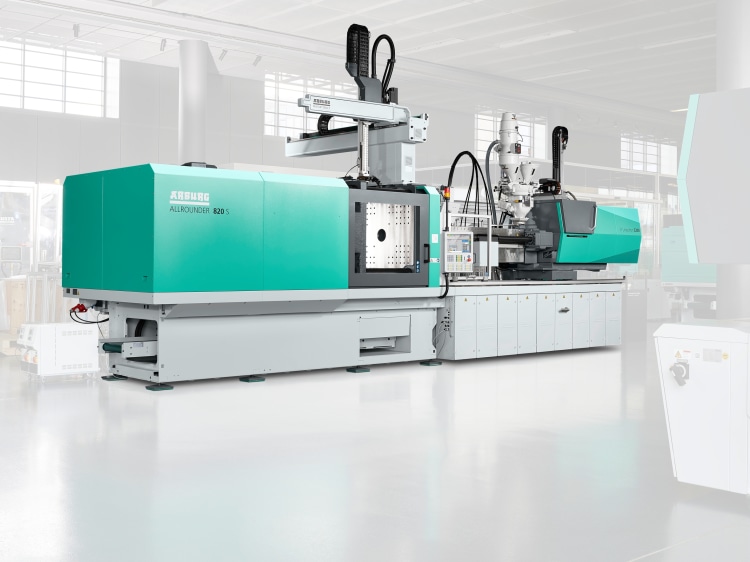Flexible turnkey system produces injection moulded parts on demand
As a smart exhibit, a compact turnkey system built around a vertical Allrounder 375 V produces various types of elastic tension straps on demand from shot to shot – without any need for conversion, thanks to a clever product and mould design and Industry 4.0 components. The customer requirements are integrated into the running injection moulding process online. Visitors will be able to choose between elastic tension straps of three different lengths in three colours and with three different end piece combinations, entering their variant of choice directly at a terminal. After the order has been transferred to the central Selogica control system, the tension strap is cut to the selected length and handled by a space-saving six-axis robot located within the machine installation area. It places the ends of the strap in the cavities of the 4-cavity mould, where hook/hook, hook/eyelet or eyelet/eyelet combinations are moulded in a cycle time of about 40 seconds. In industrial practice, such a system would be ideal for cable assembly in the automotive industry, for example.
FDC process for innovative lightweight construction
A resource-saving lightweight construction application will be presented for the "arburgGREENworld" program: Arburg shows how plastic can replace metal in some cases using fibre direct compounding (FDC). In this innovative lightweight construction injection moulding process, a lateral feeder cuts glass fibre rovings into lengths before adding them directly into the liquid melt to reinforce the component with continuous fibres. The materials involved in this technique are readily available and the process reduces costs by up to 40 percent, but these are just some of its advantages. The fibre length, fibre content and material combination can be adapted really flexibly to influence the component properties in a targeted manner.
The exhibit, a hydraulic Allrounder 820 S with a clamping force of 4,000 kN, produces long glass fibre-reinforced PP platforms for use in the seat adjusters installed in car interiors. The cycle time is around 60 seconds and the weight of the moulded part 250 g. The consistency of the shot weight, and therefore of the fibre content, is displayed via a weight monitor integrated into the automation system, with the measurement being checked as a process parameter in the control system. A linear Multilift Select robotic system deposits the finished parts on a conveyor belt.

High-performance machine for the packaging industry
A hybrid Allrounder 820 H in the clamp design and a special Packaging version will demonstrate how mass-manufactured articles can be produced really efficiently for the packaging industry. This high-performance machine has a clamping force of 3,700 kN, a size 2100 injection unit and the “Thin-walled part” package of optional extras. It stands out from the crowd thanks to excellent dynamics, reproducibility and injection speeds of up to 500 mm/s. The machine is “Ready for digitalisation” by virtue of the four assistance packages, which come as standard on all Allrounders in the clamp design and featuring the Gestica control system. The exhibit produces four thin-walled PP IML containers with a capacity of 500 millilitres each in a cycle time of around four seconds. This equates to an output of roughly 3,900 units per hour. The IML system from Swiss company Mueller inserts the labels, removes the finished containers and stacks them on a conveyor belt.
Additive manufacturing
Arburg will also present Arburg Plastic Freeforming (APF) and its product portfolio for industrial additive manufacturing at Chinaplas. On display will be a Freeformer 200-3X with two discharge units and a large Freeformer 300-3X with three discharge units. Both exhibits will turn original plastic granules into functional components “live”. Visitors will also be able to see a broad range of components and test the quality of selected APF parts for themselves at interactive stations.



